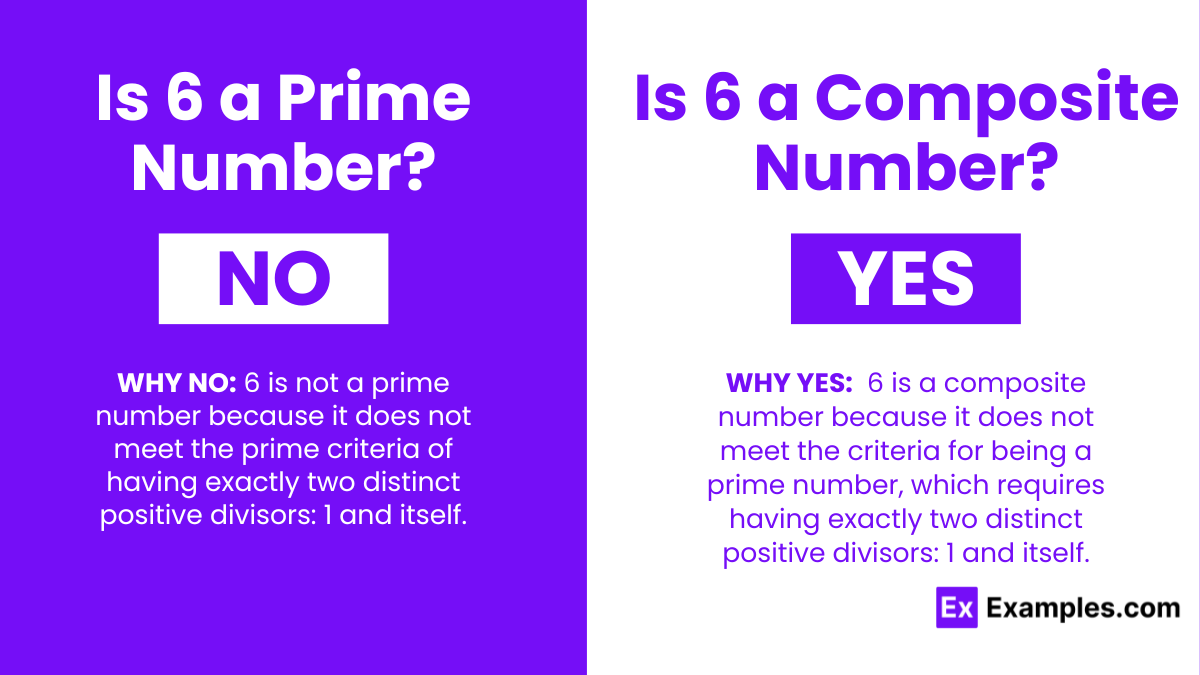Is 6 a prime number or a composite number?
Prime
Composite
Neither
Both


No – 6 is not a prime number.
Why No:6 is not a prime number because it does not meet the prime criteria of having exactly two distinct positive divisors: 1 and itself. Instead, 6 has four divisors: 1, 2, 3, and 6.Use this Prime Number Checker Tool to see if its a prime number.
YES – 6 is a Composite Number.
Why Yes: 6 is a composite number because it does not meet the criteria for being a prime number, which requires having exactly two distinct positive divisors: 1 and itself. Instead, 6 has more than two divisors: 1, 2, 3, and 6.
| Property | Answer |
|---|---|
| Is 6 a prime number? | No |
| Is 6 a composite number? | Yes |
| Is 6 a perfect square? | No |
| Factors of 6 | 1, 2, 3, 6 |
| Multiples of 6 | 6, 12, 18, 24, 30, 36, 42, 48, 54, 60 |
| Cube Root of 6 | Not a whole number |
| Square of 6 | 36 |
| Square Root of 6 | 2.449 |
| Is 6 a Perfect Square? | No |
| Is 6 a Perfect Cube? | No |
| Is 6 an Irrational number | No |
| Is 6 a Rational number | Yes |
| Is 6 a Real number | Yes |
| Is 6 an Integer | Yes |
| Is 6 a Natural number | Yes |
| Is 6 a Whole number | Yes |
| Is 6 an Even or odd number | Yes (6 is an even number) |
| Is 6 an Ordinal number | Yes |
| Is 6 a Complex number | Yes (as all real numbers are also complex numbers) |
The factors of 6 are 1, 2, 3, and 6. These are the numbers that can divide 6 evenly without leaving a remainder.
6 is recognized not as a prime number but as a composite number because it has divisors other than 1 and itself, specifically 1, 2, and 3. This distinguishes it from prime numbers, which have exactly two distinct positive divisors. The number 6, in particular, is often associated with harmony, balance, and perfection in many cultures due to its mathematical properties, such as being the first perfect number. Its status as a composite number and its cultural significance highlight the interesting connections between mathematics and human belief systems. The allure of 6 extends beyond its mathematical properties, delving into its symbolic and harmonious aspects, thereby enhancing our understanding of numbers not merely as abstract entities, but as symbols of balance and unity.
No, 6 is not a perfect square. A perfect square is a number that can be expressed as the product of an integer with itself, and there is no integer whose square equals 6.
The prime factors of 6 are 2 and 3. These are the prime numbers that can be multiplied together to give the original number, 6 (2 x 3 = 6).
Text prompt
Add Tone
10 Examples of Public speaking
20 Examples of Gas lighting
Is 6 a prime number or a composite number?
Prime
Composite
Neither
Both
What type of number is 6?
Prime
Composite
Square
Perfect
How many factors does 6 have?
2
3
4
6
What is the prime factorization of 6?
2 × 3
2 × 2 × 3
2 × 3 × 3
2 × 2 × 2 × 3
Which statement is true about 6?
6 is a prime number.
6 has exactly two factors.
6 is not a prime number.
6 is a perfect square.
What is the smallest composite number?
4
5
6
7
Is 6 divisible by any number other than 1 and itself?
Yes
No
Only by 1
Only by itself
If a number has exactly three factors, is it prime or composite?
Prime
Composite
Neither
Both
How does 6 compare to the number 5 in terms of being prime or composite?
Both are prime
Both are composite
6 is composite, 5 is prime
6 is prime, 5 is composite
Which property does not apply to 6?
Prime
Composite
Divisible by 2
Divisible by 3
Before you leave, take our quick quiz to enhance your learning!

